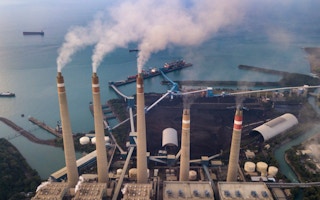There is a bias towards “revolutionary” climate solutions in Southeast Asia, at the expense of existing methods which are cheaper and more effective, according to a report by American consultancy Bain & Company.
To continue reading, subscribe to Eco‑Business.
There's something for everyone. We offer a range of subscription plans.
- Access our stories and receive our Insights Weekly newsletter with the free EB Member plan.
- Unlock unlimited access to our content and archive with EB Circle.
- Publish your content with EB Premium.
Technologies like carbon capture and hydrogen fuel produced from renewables could work in the future, but will take time to reach commercial viability, it said. In the meantime, not enough attention is placed on proven solutions like optimising supply chains or using efficient air conditioning.
Forest conservation, sustainable farming and electric vehicles are also effective solutions that should be pursued, the report added.
“Many countries in the region today seem to be betting heavily on new and emerging solutions. They are betting on silver bullets,” said Dale Hardcastle, the Southeast Asia head for energy and natural resources at Bain & Company.
“I am not by any means suggesting that we shouldn’t be getting behind hydrogen, carbon capture and other new innovative solutions, but rather, a more holistic approach that leaves no stone unturned is needed,” he added at a launch event for the report.
The study, which also included contributions from Singapore state investor Temasek and American tech giant Microsoft, comes on the back of earlier calls to prioritise existing solutions to fight climate change.
In April, the Intergovernmental Panel on Climate Change said nature-based solutions and renewable energy were the best climate mitigation options.
That month, Institute for Energy Economics and Financial Analysis, a US-based think-tank, also said that Southeast Asia may be captivated by an unfeasible vision of deploying pricey carbon capture at scale.
Many Southeast Asian countries lack incentives for people to adopt existing solutions. For example, there is a dearth of energy efficiency grants and financing schemes for sustainable agriculture, the Bain & Company report said.
“The approach should also consider a more inclusive way of thinking about small and medium enterprises, as well as smallholder farmers across the region who account for an amazing half of total gross domestic product,” Hardcastle added.
“
I am not by any means suggesting that we shouldn’t be getting behind hydrogen, carbon capture and other new innovative solutions, but rather, a more holistic approach that leaves no stone unturned is needed.
Dale Hardcastle, Southeast Asia head for energy and natural resources, Bain & Company
Small businesses in the region make up over 97 per cent of all enterprises in Southeast Asia and contributes just under 2 per cent of total annual emissions, according to a study last year.
The Bain & Company report said authorities may also be underestimating the amount of money needed for a clean energy transition, by omitting key considerations such as how to properly integrate renewable energy sources into the grid.
It warned that the cost of renewables may rise with greater adoption, citing studies from Europe and India.
“We simply have not fully acknowledged the true costs of introducing renewables at scale and upgrading the infrastructure,” said Hardcastle.
“Much more work is needed to understand exactly what the cost is, because uncertainty will continue to inhibit investors,” he added.
The report suggested exploring public-private financing options and developing detailed regulations to confront the higher costs.
There should be greater regional collaboration, it added.
Huge decarbonisation challenge
Southeast Asia needs to cut three gigatonnes of emissions by 2030 to be aligned to a global warming pathway of under 1.5 degrees Celsius, the report said. That is about twice the amount Southeast Asian countries emitted in 2020, according to data from research initiative Global Carbon Project.
The effort will require US$3 trillion in investments, of which less than 1 per cent has been invested. As such, no country in the region is on track for the 1.5°C scenario, which is widely deemed a safe level of climate change for humanity.
That is despite eight of 10 Southeast Asia countries having already committed to reaching net-zero carbon emissions, by 2065 latest – 15 years behind when scientists say should be the deadline. Myanmar and the Philippines have not declared net-zero goals.
The region’s carbon emission is projected to increase 60 per cent to 2.4 gigatonnes by 2040, spurred by the continued use of fossil fuels and increasing energy demand from a rapidly growing economy.
There is also a high rate of deforestation, the report said.
It added that concerns about inflation, along with energy and food security, may slow decarbonisation efforts.
In Europe, coal use is on the rise as the bloc attempts to wean off Russian energy, despite many countries having ambitious decarbonisation plans.
The report said climate action in Southeast Asia nonetheless represents a significant moneymaking venture, with US$1 trillion of annual opportunities by 2030.
The figure includes returns from sales, and non-monetary benefits such as having to use less cropland with better farming practices.
About US$50 billion lies in electric vehicles, with huge markets in countries such as Indonesia and Thailand.
Another US$40 billion is available in energy efficiency solutions for buildings. Renewables and sustainable farming opportunities offer US$30 billion each, while forest conservation holds US$20 billion of promise.










